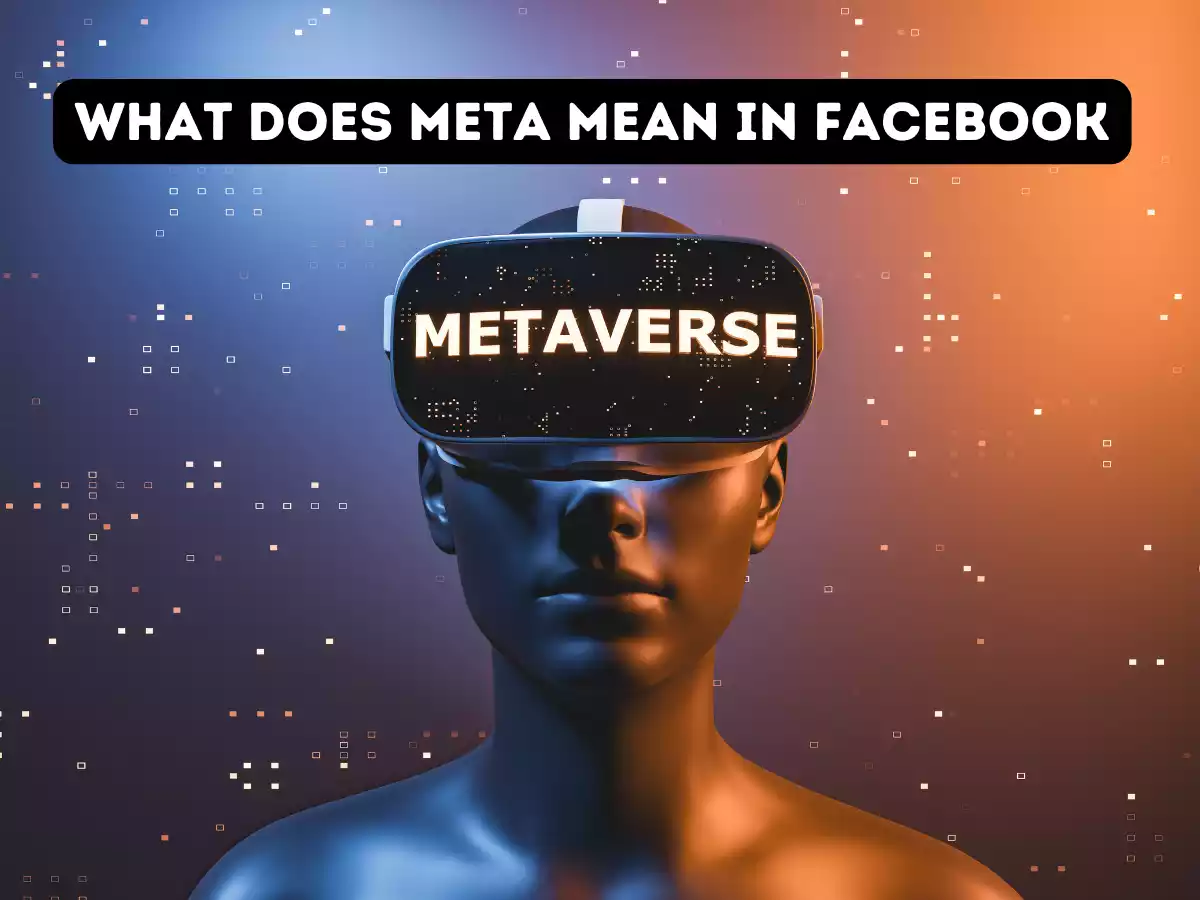In October 2021, Facebook announced that it would be changing its name to Meta. The company’s CEO, Mark Zuckerberg, explained that the new name reflected the company’s shift towards building the Metaverse, a virtual world that allows people to interact in a variety of ways. Zuckerberg stated that the Metaverse would be the next generation of the internet, and that it would be a key focus for the company going forward.
The name change was also seen as a way for Facebook to distance itself from some of the negative associations that have been attached to its name in recent years. Facebook has faced criticism for a range of issues, including its handling of user data, the spread of misinformation on its platform, and concerns about the impact of social media on mental health.
By rebranding itself as Meta, the company may be hoping to shift the conversation away from these negative associations and towards its vision for the future of technology. The new name also reflects the company’s broader ambitions beyond social media, as it seeks to build a range of products and services that are focused on the Metaverse.
Table of Contents
ToggleDefinition of Meta and its significance in technology
Meta is a term that refers to something that is self-referential or self-aware. In technology, the term is often used to describe tools or systems that allow users to interact with and manipulate data in a more intuitive and efficient way. Meta can also refer to a layer of abstraction that sits on top of existing technologies, allowing users to interact with them in new and different ways.
The significance of Meta in technology is that it allows for more flexible and adaptable systems. By building tools and systems that are more self-referential and self-aware, developers can create technologies that are easier to use and more responsive to user needs. This can lead to more innovative and user-friendly products and services, and can help to drive technological progress and innovation.
In the context of Facebook’s new name, the term Meta is being used to reflect the company’s focus on building tools and systems that are more self-referential and self-aware, particularly in the context of the Metaverse. By using the term Meta, Facebook is signaling that it is committed to building innovative and user-friendly technologies that will help to drive the development of the Metaverse and the future of technology more broadly.
How Meta fits into Facebook's overall strategy
Meta fits into Facebook’s overall strategy by serving as a new umbrella brand for a range of products and services that are focused on the Metaverse. The Metaverse is a virtual world that allows people to interact in a variety of ways, and Facebook sees it as the next generation of the internet. By creating Meta, Facebook is signaling that it is no longer just a social media company, but a company focused on building products and services for the Metaverse.
Under the Meta brand, Facebook is developing a range of products and services that will allow users to interact with the Metaverse in new and innovative ways. These include virtual and augmented reality devices, social media platforms that are designed for the Metaverse, and tools for building and designing virtual environments. The company has also stated that it plans to invest heavily in research and development for the Metaverse, with the goal of building a fully immersive and interconnected virtual world.
Overall, Meta fits into Facebook’s strategy by allowing the company to diversify its offerings beyond social media and into the Metaverse. By investing heavily in this area, Facebook is positioning itself to be a leader in the development of the Metaverse, which is expected to be a major driver of technological progress and innovation in the coming years.
Metaverse and its potential impact on society
The Metaverse is a term used to describe a shared virtual space where users can interact with each other and with digital objects in a variety of ways. It is a fully immersive and interconnected virtual world that blurs the line between physical and digital spaces. The concept of the Metaverse has been around for several decades, but recent advances in technology, such as virtual and augmented reality, have made it more feasible than ever before.
The potential impact of the Metaverse on society is significant. It has the potential to transform the way we live, work, and interact with each other. In the Metaverse, people can work, socialize, and play in fully virtual environments, without the constraints of physical space or distance. This could lead to a more interconnected and globalized world, where people from all over the world can interact with each other on a more equal footing.
However, the Metaverse also raises some important questions and concerns. For example, there are concerns about privacy and security in virtual environments, as well as the potential for addiction and other negative mental health effects. Additionally, there are concerns about the potential for the Metaverse to exacerbate existing inequalities, particularly if access to these virtual spaces is limited to those who can afford the necessary technology.
Overall, the Metaverse has the potential to be a transformative technology with far-reaching impacts on society. However, it is important to consider these potential impacts and to address any concerns or issues that may arise as the technology develops.
Facebook's plans for building the Metaverse
Facebook’s plans for building the Metaverse are ambitious and far-reaching. The company has stated that it sees the Metaverse as the next generation of the internet and is investing heavily in research and development to bring this vision to life.
Some of the specific plans that Facebook has for building the Metaverse include:
Facebook is already a leader in virtual and augmented reality technologies, and it plans to continue to develop these devices to make them more immersive and user-friendly.
Facebook has already launched a beta version of its first Metaverse social media platform, called Horizon Workrooms. This platform is designed to allow users to collaborate and work together in virtual environments.
Facebook is developing tools that will allow developers to create and design virtual environments more easily, with the goal of making it more accessible for people to build their own virtual spaces.
Facebook has stated that it plans to invest billions of dollars in research and development for the Metaverse, with the goal of creating a fully immersive and interconnected virtual world.
Overall, Facebook’s plans for building the Metaverse are focused on creating a seamless and immersive virtual world that allows users to interact with each other and with digital objects in new and innovative ways. The company sees the Metaverse as a major opportunity for growth and innovation, and it is investing heavily in this area to bring its vision to life.
Facebook's current products and services under the Meta brand
Facebook has already started to roll out a number of products and services under the Meta brand, with a focus on building tools and platforms for the Metaverse. Some of the current products and services under the Meta brand include:
Horizon Workrooms
This is a virtual reality platform designed for remote collaboration and meetings. Users can join virtual meeting rooms and interact with each other using avatars in a fully immersive environment.
Oculus VR
Oculus is a virtual reality platform developed by Facebook that includes a range of VR devices, including the Oculus Quest and Oculus Rift. These devices are designed to be used with virtual reality games and applications, as well as with the Horizon Workrooms platform.
Spark AR
Spark AR is an augmented reality platform developed by Facebook that allows developers to create AR effects and filters for use on Facebook and Instagram.
Facebook Reality Labs
This is the research and development arm of Facebook focused on developing new technologies and products for the Metaverse. It is responsible for developing new hardware, software, and user interfaces for virtual and augmented reality devices.
MetaOS
This is a new operating system that Facebook is developing specifically for the Metaverse. It is designed to provide a seamless and consistent user experience across a range of devices and platforms.
Overall, the current products and services under the Meta brand are focused on developing new technologies and platforms for the Metaverse. Facebook sees the Metaverse as the next generation of the internet, and it is investing heavily in this area to create a fully immersive and interconnected virtual world.
Criticisms and concerns surrounding the Metaverse
As with any new and emerging technology, the Metaverse and Facebook’s plans for it have faced criticism and concerns from various stakeholders. Some of the main criticisms and concerns include:
Privacy and security
There are concerns about privacy and security in the Metaverse, particularly with regard to data collection and tracking of users. As with other online platforms, there is a risk that personal data could be misused or hacked.
Digital addiction and mental health
The immersive nature of the Metaverse could potentially lead to addictive behaviors and negative mental health impacts, particularly for vulnerable users such as children and young people.
Inequality and accessibility
There are concerns that the Metaverse could exacerbate existing inequalities, particularly if access to the technology is limited to those who can afford it. There are also concerns about accessibility for people with disabilities.
Corporate control
There are concerns about the level of control that corporations such as Facebook could exert over the Metaverse, particularly if they are the dominant platform providers. This could potentially lead to a lack of competition and innovation.
Legal and regulatory issues
The development of the Metaverse raises a range of legal and regulatory issues, including intellectual property rights, virtual property rights, and jurisdictional issues.
Overall, there are a range of criticisms and concerns surrounding the Metaverse and Facebook’s plans for it. It will be important for these concerns to be addressed and mitigated in order to ensure that the development of the Metaverse is done in a responsible and ethical way.
Conclusion
In conclusion, the recent name change of Facebook to Meta reflects the company’s ambitious plans to build the Metaverse – a virtual world that aims to create a more immersive, interconnected and accessible internet experience. The Metaverse has the potential to transform the way we interact with each other and with digital technology, but it also raises a range of valid concerns and criticisms, including issues related to privacy, security, addiction, inequality, accessibility, and corporate control.
Facebook has responded to these concerns by committing to prioritize privacy and security, supporting digital wellbeing, promoting accessibility and diversity, fostering competition and innovation, and engaging with regulators and other stakeholders to address legal and regulatory issues. However, it will be important for Facebook and other companies to continue to address these concerns and work collaboratively to ensure that the development of the Metaverse is done in a responsible and ethical way that benefits all users.




